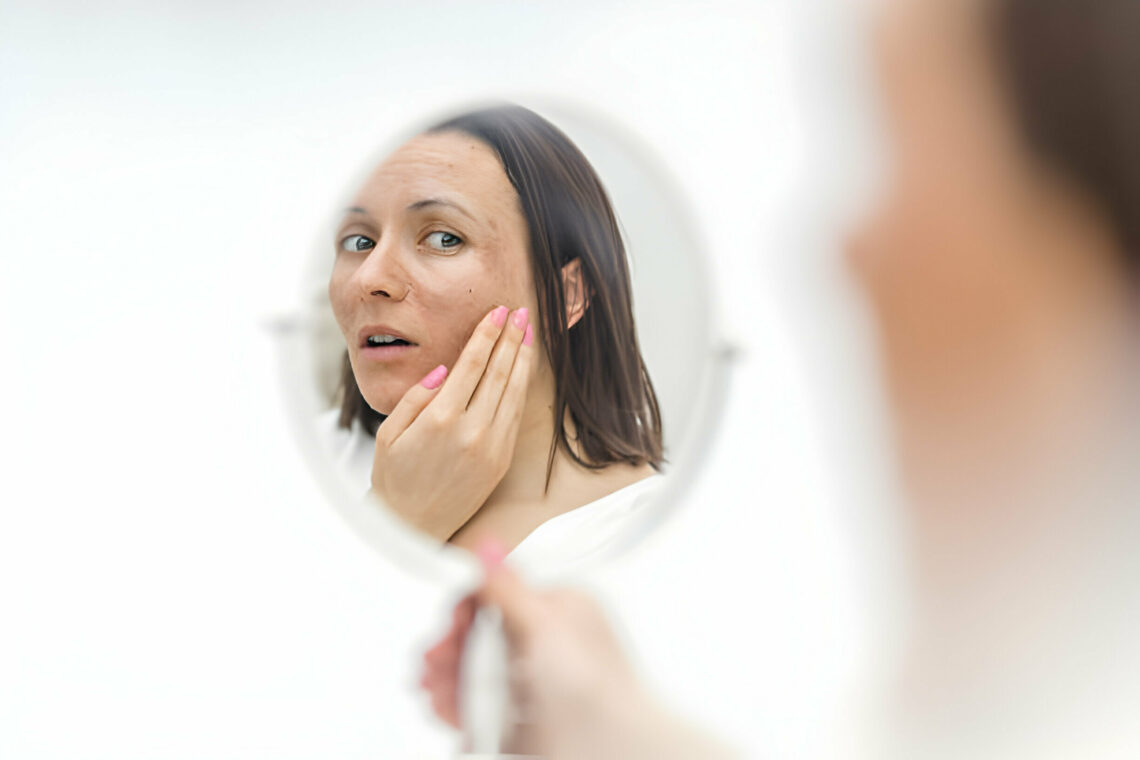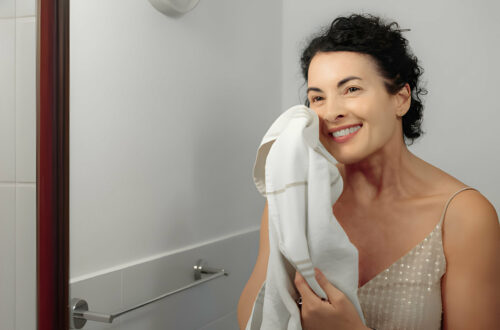If you have dark spots on your skin because of hyperpigmentation and find it annoying, you’re in luck. There are more ways to get rid of these harmless but bothersome discolorations today than ever before.
So, what is hyperpigmentation? It’s when a patch of your skin appears darker than your usual skin tone because there’s too much of the brown pigment called melanin. Hyperpigmentation can show up in liver spots (also known as age spots) and sunspots, as mentioned by the Cleveland Clinic.
Four common factors can lead to hyperpigmentation, according to the Cleveland Clinic. These factors can affect people of all skin tones to different extents.
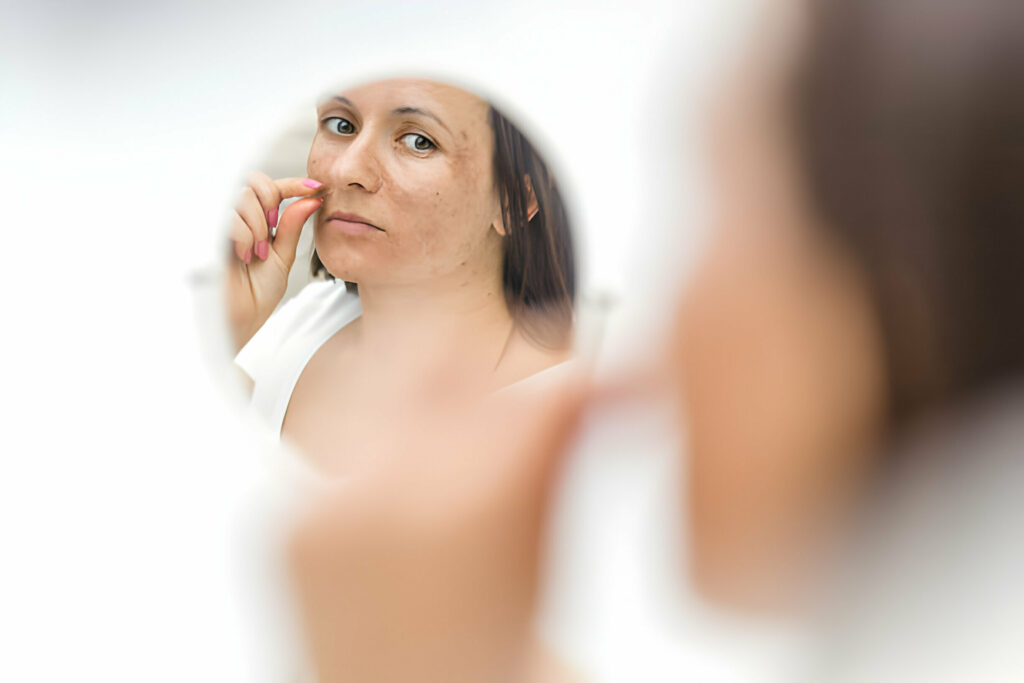
- Inflammation Skin problems like acne, eczema, bug bites, cuts, scrapes, or even rubbing too hard can lead to inflammation. This inflammation can make cells that create dark pigments go into overdrive, leaving behind a dark spot even after the injury has healed. Incorporating skin care for rosacea and eczema skin care can help manage inflammation. When inflammation causes discoloration, it’s often called post-inflammatory hyperpigmentation.
- Sun Exposure The sun’s UV rays make your skin produce extra melanin to protect itself. This extra melanin gives you a tan. But if you get too much sun or do it often, you might develop dark sunspots. While sunspots are not cancerous, sun-exposed skin can sometimes develop precancerous spots that look similar to sunspots. This is why it’s important to have your skin checked by a dermatologist every year.
- Melasma, often called the ‘mask of pregnancy,’ leads to brown patches in women with changing hormone levels, like during pregnancy. It can also happen in men. Sun exposure, genetics, and hormonal changes, like using oral contraceptives, can trigger melasma. Other hormonal medications for birth control and menopause symptoms can also cause it, according to experts at the American Osteopathic College of Dermatology (AOCD). Incorporating skin care during menopause can help manage these changes.
- Medical Conditions or Medication Hyperpigmentation can be caused by Addison’s disease, which affects the adrenal glands and increases melanin production. Certain medications, such as antibiotics, nonsteroidal anti-inflammatory drugs (NSAIDs), and antimalarials, can increase the risk of hyperpigmentation. Some chemotherapy drugs can cause temporary dark spots, but they usually fade 10 to 12 weeks after treatment as new skin cells replace the old ones.
Here are the best ways to treat and prevent future hyperpigmentation. Today, you have many options for dark-spot correction, but it’s equally important to take preventive measures. The following scientifically proven steps can be of help:
- Keep Your Skin Moist for Improved Cell Renewal When dealing with hyperpigmentation, your main aim is to lighten dark spots. An effective over-the-counter (OTC) moisturizer should not only target pigment issues but also contain ingredients that benefit your skin in other ways. According to Doris J. Day, MD, a clinical assistant professor of dermatology at NYU Medical School, a good product should include moisturizing agents like glycerin or hyaluronic acid, and maybe even retinol to enhance cell turnover. These inactive ingredients help the active brighteners work better. Additionally, a good moisturizer can help restore your skin’s lipid barrier, ensuring that new skin cells remain healthy as they replace the old ones, as suggested by the University of Tennessee Medical Center.
- Avoid touching bug bites, blackheads, and other skin injuries. While it may be tempting to scratch a mosquito bite or squeeze a stubborn blackhead, it’s crucial to remember the advice your mother gave: ‘Don’t pick!’ Listen to that advice. Jeanine Downie, MD, a dermatologist and the director of Image Dermatology in Montclair, New Jersey, warns that scratching or picking at spots will only worsen the inflammation responsible for skin discoloration. Incorporating an acne skin care routine can help manage these issues. The more you interfere with these spots now, the worse they may appear later.
Try Over-the-Counter Skin Brightening Options The sooner you start treating hyperpigmentation, the easier it will be to make it disappear. Dr. Downie explains that the pigment in brown spots can go deeper into the skin if you wait.
Over-the-counter (OTC) treatments with ingredients that help remove spots include azelaic acid, glycolic acid, vitamin C, and retinoids, according to the American Academy of Dermatology Association (AAD).
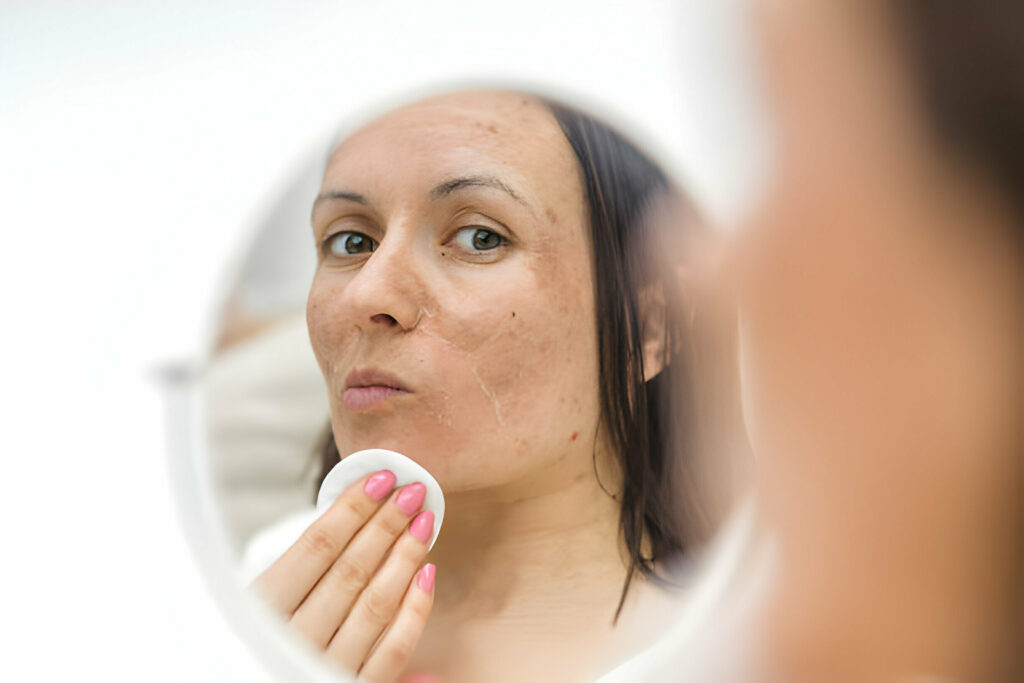
Ni’Kita Wilson, a cosmetic chemist in New York City, says, “Treatments with ingredients like vitamin C, licorice root, and kojic acid can reduce hyperpigmentation by stopping the enzyme tyrosinase, which makes darkening melanin in the skin.” Research published in 2017 in the Journal of Enzyme Inhibition and Medicinal Chemistry backs up Wilson’s advice, explaining that understanding the connection between tyrosinase and excess melanin has led to the development of several OTC products with these ingredients.
While many of these OTC ingredients can “lighten” dark spots, the AAD strongly warns against using liquid bleach on your skin. The group recommends using products made in the United States, as some imported skin-lightening products have been found to contain mercury, steroids, and other harmful substances.
- Consider Prescription Solutions for Stubborn Skin Discoloration If over-the-counter treatments aren’t doing the job, it’s time to consult the experts. Dermatologists regard products containing hydroquinone, either on its own or combined with other lightening agents, as the top choice for fading dark spots. It works by slowing down pigment production and can be obtained with a prescription, as per the U.S. Food and Drug Administration (FDA). Dr. Downie says, “It’s our first choice because, unlike many over-the-counter products, it’s almost always effective at getting rid of hyperpigmentation.” However, be sure to have your dermatologist closely monitor your hydroquinone treatment. In high concentrations, hydroquinone can make your skin more sensitive to the sun and may even lighten it.
Alongside hydroquinone, the AOCD suggests that your dermatologist might recommend other treatments, such as topical cortisone cream or tretinoin, a synthetic form of vitamin A. - Protect Your Skin From the Sun The best way to prevent sun-related discoloration is to consistently apply a broad-spectrum sunscreen with an SPF of 30 or higher every day, even on cloudy or cooler days. Dr. Day emphasizes that UV rays can make dark spots darker, so wearing sunscreen daily on exposed areas is a must.
SPF mainly shields you from UVB short-wave rays. To also guard against UVA long-wave rays, the Centers for Disease Control and Prevention (CDC) suggests choosing a product that contains Mexoryl,Parsol 1789, titanium dioxide, zinc oxide, or avobenzone.
Additionally, the AAD recommends staying indoors between 10 a.m. and 2 p.m., when the sun is at its strongest. You can also wear a wide-brimmed hat to protect not only your face but also your head, ears, and neck.
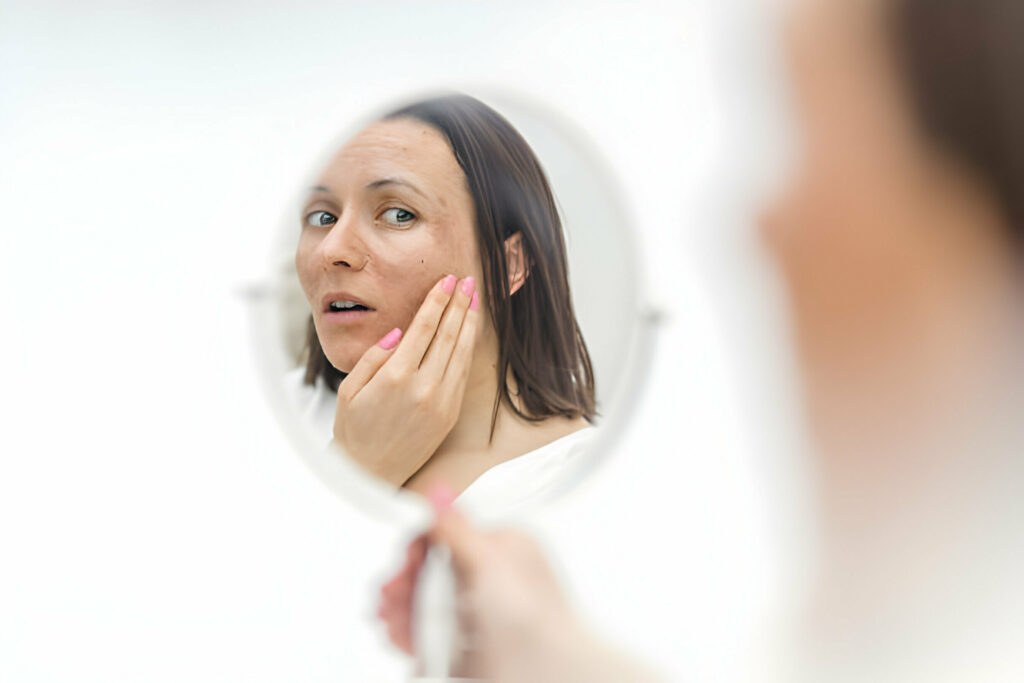
Consult a Dermatologist for Advanced Solutions If creams and lotions aren’t solving your skin discoloration problem, it’s a good idea to have a discussion with your dermatologist about more potent methods to eliminate the discoloration. These options may include chemical peels, microdermabrasion, dermabrasion, or, according to the International Association for Physicians in Aesthetic Medicine, a laser resurfacing procedure. However, it’s essential to note that if you have melasma, lasers are considered a less preferred option, as they may not effectively reduce excess melanin production, as indicated in a review published in March 2017 in the International Journal of Women’s Dermatology.
- Additional Measures to Prevent or Reduce Future Damage In addition to treatment and sun protection, there are other steps you can take to lower the chances of developing more dark spots in the future. Use gentle skin-care products that don’t cause stinging or burning, as irritation can worsen or trigger hyperpigmentation. Also, safeguard yourself against common causes of skin darkening by using acne medication to combat pimples and applying bug spray to avoid insect bites.
